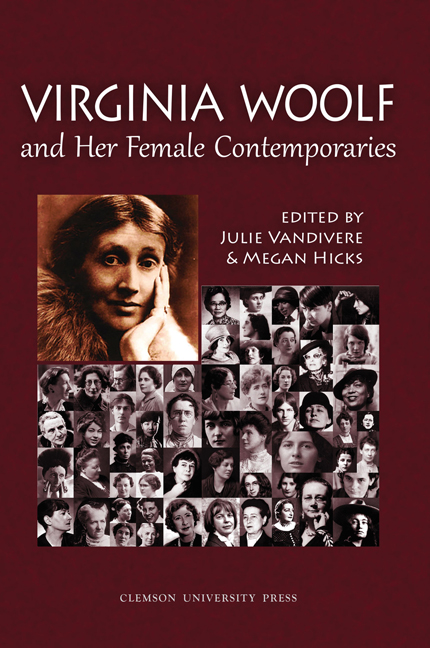Book contents
- Frontmatter
- Table of Contents
- Introduction
- Acknowledgments
- Abbreviations
- Who Are Virginia Woolf's Female Contemporaries?
- Considering Contemporaneity: Woolf and “the Maternal Generation”
- Who Is My Contemporary?: Woolf, Mansfield, and Their Servants
- “The World is My Country”: Emma Goldman among the Avant-Garde
- “Definite, Burly, and Industrious”: Virginia Woolf and Gwen Darwin Raverat
- “A Verbal Life on the Lips of the Living”: Virginia Woolf, Ellen Terry, and the Victorian Contemporary
- Twists of the Lily: Floral Ambivalence in the Work of Virginia Woolf and Georgia O'Keeffe
- Virginia Woolf's Cultural Contexts
- Virginia Woolf's Contemporaries Abroad
- Virginia Woolf's Contemporaries at Home
- Tribute to Jane Marcus
- Notes on Contributors
- Conference Program 223
“The World is My Country”: Emma Goldman among the Avant-Garde
from Who Are Virginia Woolf's Female Contemporaries?
- Frontmatter
- Table of Contents
- Introduction
- Acknowledgments
- Abbreviations
- Who Are Virginia Woolf's Female Contemporaries?
- Considering Contemporaneity: Woolf and “the Maternal Generation”
- Who Is My Contemporary?: Woolf, Mansfield, and Their Servants
- “The World is My Country”: Emma Goldman among the Avant-Garde
- “Definite, Burly, and Industrious”: Virginia Woolf and Gwen Darwin Raverat
- “A Verbal Life on the Lips of the Living”: Virginia Woolf, Ellen Terry, and the Victorian Contemporary
- Twists of the Lily: Floral Ambivalence in the Work of Virginia Woolf and Georgia O'Keeffe
- Virginia Woolf's Cultural Contexts
- Virginia Woolf's Contemporaries Abroad
- Virginia Woolf's Contemporaries at Home
- Tribute to Jane Marcus
- Notes on Contributors
- Conference Program 223
Summary
Upon her deportation from America in 1919, Emma Goldman remarked:
The apparent cancellation of my citizenship…shows how any woman married to a naturalized citizen and feeling secure in her citizenship may suddenly find herself an alien, and because of some opinion she may hold that may be unpopular, find herself an arrested alien and deported from the country.
Goldman was a Russian-Jewish immigrant to America, as well as a feminist and anarchist, the founder of Mother Earth magazine, and a passionate advocate for birth control, workers’ rights, and free speech. She believed, she said, “in everyone's right to radiant, beautiful things” (Living 56). After Goldman's imprisonment for speaking out against conscription during the First World War, she was stripped of her American citizenship on trumped-up charges relating to her brief marriage thirty years earlier to Jacob Kershner, a fellow immigrant. The U.S. government had been trying to deport Goldman for over a decade; J. Edgar Hoover reputedly called her “the most dangerous woman in America,” not just because she was an anarchist, but because of her perceived influence over the immigrant working classes. Goldman's loss of citizenship was based on a legal argument about her married status, and thus echoes Virginia Woolf's discussion of women and national identity in Three Guineas (1938). In Woolf's famous words: “As a woman, I have no country. As a woman I want no country. As a woman my country is the whole world” (129). In her life and work, Goldman embodied Woolf's call for women to write and act as engaged outsiders.
I hope to convince you that Emma Goldman's life and work can and should be considered within the context of both Woolf studies and of modernist women writers more generally. I will first discuss the question of gender and citizenship as it echoes from Goldman's biography to Woolf 's Three Guineas, before moving on to offer a brief glimpse of Goldman's European years, which brought her into the expatriate network of female modernists, including Emily Coleman, Peggy Guggenheim, Margaret Anderson, and Jane Heap. The larger project I am embarking upon concerns Goldman's relationships with other modernist women; ultimately, I want to argue that Emma Goldman's example played an influential role in shaping modernist women's revolutionary experiments with desire, domesticity, work, and aging.
- Type
- Chapter
- Information
- Virginia Woolf and Her Female Contemporaries , pp. 15 - 21Publisher: Liverpool University PressPrint publication year: 2016



